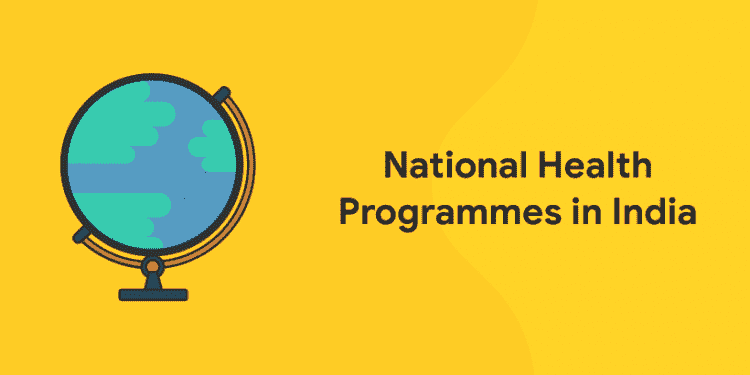Table of Contents
The National Health Programs, which have been launched by the Central Government of control/ eradication of communicable diseases, improvement of environmental sanitation, raising the standard of nutrition, control of population and improving rural health. Various International agencies like WHO, UNICEF, UNFPA, World Bank, as well as a number of foreign agencies like SIDA, DANIDA, NORAD, USAID have been providing technical and material assistance in the implementation of these health programs. This article lists out the National Health Programmes in India.
Objectives and Activities of National Health Programmes in India
The major objectives are listed down for improving the health status of the population and enhancing the related quality of life through:
- Creating conditions and developing personal motivation, knowledge and skills to choose healthy lifestyle and undertaking actions for improving own health and that of the others.
- Creating environments supportive to health, work and education.
- Reducing inequalities in health and access to health services.
Learn with Entri and ace your exam preparations
Activities
- Promoting physical activity among the general population.
- Promoting healthy diet and improving food quality.
- Reducing tobacco smoking.
- Reducing alcohol consumption, changing alcohol consumption patterns, and reducing alcohol abuse-related health damage.
- Reducing abuse of other psychoactive substances and drug abuse-related health damage.
- Improving efficiency of health education and health promotion programmes.
- Promoting mental health and preventing mental disorders.
- Reducing exposure to harmful factors in the living, working and educational environment and mitigating their health effects.
- Improving sanitation throughout the country.
- Reducing the incidence of accidents, and traffic accidents in particular.
- Improving efficiency and effectiveness of emergency services in life threatening conditions, access to and efficiency of primary health care.
- Preventing premature births, low birth weight and reducing related health effects.
- Improving early diagnosis and active care of persons at risk of ischaemic heart disease; and treatment of breast and cervical cancers.
- Providing better opportunities for people with disabilities and developing their capacities to lead active lives.
- Improving prevention of communicable diseases, dental caries and periodontal disease in children, adolescents and pregnant women.
Download Entri & get free mock tests for various competitive exams
National Health Programmes in India
A human being’s good state of health has a major role in shaping and contributing something to the society. Each programmes are listed below and some of its objective too.
Reproductive, Maternal, Neonatal, Child and Adolescent health
- Janani Shishu Suraksha Karyakaram (JSSK):
Government of India has launched Janani Shishu Suraksha Karyakaram (JSSK) on 1st June, 2011. The scheme is estimated to benefit more than 12 million pregnant women who access Government health facilities for their delivery. Moreover it will motivate those who still choose to deliver at their homes to opt for institutional deliveries.
- Rashtriya Kishor Swasthya Karyakram(RKSK)
- Rashtriya Bal SwasthyaKaryakram (RBSK)
- Universal Immunisation Programme:
Immunization Programme in India was introduced in 1978 as ‘Expanded Programme of Immunization’ (EPI) by the Ministry of Health and Family Welfare, Government of India. Vaccines come under this section (BCG, OPV, Hepatitis B, Pentavalent vaccine, Rotavirus, PCV, etc.)
- Mission Indradhanush / Intensified Misson Indradhanush
- Janani Suraksha Yojana (JSY)
- Pradhan Mantri Surakshit Matritva Abhiyan (PMSMA)
- Navjaat Shishu Suraksha Karyakram (NSSK)
- National Programme for Family planning
National Nutritional Programmes
- National Iodine Deficiency Disorders Control Programme:
Iodine is required for the synthesis of the thyroid hormones which are essential for the normal growth and development and well being of all humans. Deficiency of iodine may cause following disorders: Goiter, Subnormal intelligence, Neuro-muscular weakness, Endemic cretinism, Still birth, Hypothyroidism, Defect in vision, hearing, and speech, Spasticity, Intrauterine death, Mental retardation, etc.
Download Entri and Get updated with General Knowledge
- MAA (Mothers’ Absolute Affection) Programme for Infant and Young Child Feeding:
The ‘MAA’ Programme is to revitalize efforts towards promotion, protection and support of breastfeeding practices through health systems to achieve higher breastfeeding rates. The objective is to build an enabling environment for breastfeeding through awareness generation activities, targeting pregnant and lactating mothers, family members and society in order to promote optimal breastfeeding practices. Breastfeeding to be positioned as an important intervention for child survival and development.
- National Programme for Prevention and Control of Fluorosis (NPPCF):
The objectives of NPPCFare : to assess and use the baseline survey data of fluorosis of Ministry of Drinking water & Sanitation; comprehensive management of fluorosis in the selected areas and capacity building for prevention, diagnosis and management of fluorosis cases.
- National Iron Plus Initiative for Anaemia Control
- National Vitamin A prophylaxis Programme:
Vitamin A is an important micro nutrient for maintaining normal growth, regulating cellular proliferation and differentiation, controlling development, and maintaining visual and reproductive functions. And aims to decrease the prevalence of Vitamin A deficiency.
Download Entri and Attempt free GK Quiz
- Integrated Child Development Services (ICDS):
Integrated Child Development Service (ICDS) scheme was launched on 2nd October, 1975 (5th Five year Plan) in pursuance of the National Policy for Children in 33 experimental blocks. It improves the nutrition and health status of children in the age group of 0-6 years, lay the foundation for proper psychological, physical and social development of the child, effective coordination and implementation of policy among the various departments, enhance the capability of the mother to look after the normal health and nutrition needs through proper nutrition and health education.
- Mid-Day Meal Programme: Tamil Nadu was the first to initiate a massive noon meal programme to children. Neither a child that is hungry, nor a child that is ill can be expected to learn. Realizing this need the Mid-Day Meal (MDM) Scheme was launched in primary schools during 1962-63. The Central Government supplies the full requirement of food grains for the programme free of cost. Mid-Day Meal improves three areas:
- School attendance
- Reduced dropouts
- A beneficial impact on children’s nutrition.
Communicable diseases
- Integrated Disease Surveillance Programme (IDSP)
- Revised National Tuberculosis Control Programme (RNTCP): The National TB Control Programme was started in 1962 with the aim to detect cases earliest and treat them. In the district, the programme is implemented through the district Tuberculosis Centre (DTC) and the Primary Health Institutions. The vision and goal of the programme is TB – Free India with zero deaths, disease and poverty due to tuberculosis and to achieve a rapid decline in burden of TB, morbidity and mortality while working towards elimination of TB in India by 2025 respectively.
- National Leprosy Eradication Programme (NLEP): The objectives this programme are; early detection through active surveillance by the trained health workers, regular treatment of cases by providing Multi-Drug Therapy (MDT) at fixed in or centres a nearby village of moderate to low endemic areas/district, intensified health education and public awareness campaigns to remove social stigma attached to the disease, and appropriate medical rehabilitation and leprosy ulcer care services.
- National Vector Borne Disease Control Programme:
Launched in 2003-04, to bring down malaria transmission to a level at which it would cease to be a major public health problem.
-
National Framework for a Gender-Responsive approach to TB in India:
- National AIDS Control Programme (NACP):
The National AIDS Control Programme (NACP), launched in 1992, is being implemented as a comprehensive programme for prevention and control of HIV/ AIDS in India. Over time, the focus has shifted from raising awareness to behaviour change, from a national response to a more decentralized response and to increasing involvement of NGOs and networks of People living with HIV (PLHIV).
- Pulse Polio Programme
- National Viral Hepatitis Control Program
- National Rabies Control Programme
- National Programme on Containment of Anti-Microbial Resistance (AMR)
Non-communicable diseases
- National Tobacco Control Programme (NTCP):
The objectives are to bring about greater awareness about the harmful effects of tobacco use and to facilitate effective implementation of the Tobacco Control Laws.
- National Programme for Prevention and Control of Cancer, Diabetes, Cardiovascular Diseases & Stroke (NPCDCS)
- National Programme for Control Treatment of Occupational Diseases
- National Programme for Prevention and Control of Deafness (NPPCD)
- National Mental Health Programme
- National Programme for Control of Blindness& Visual Impairment
- Pradhan Mantri National Dialysis Programme
- National Programme for the Health Care for the Elderly (NPHCE)
- National Programme for Prevention & Management of Burn Injuries (NPPMBI)
- National Oral Health Programme
Health system strengthening programs
- Ayushman Bharat Yojana
- Pradhan Mantri Swasthya Suraksha Yojana (PMSSY)
- LaQshya’ programme (Labour Room Quality Improvement Initiative)
- National Health Mission
Indian Constitution and various programs initiated by Government are the important topics usually asked in the general knowledge and current affairs part. Readers can visit the official website of National Health Portal to read more on the each programmes provided by Central Government of India. Learn with Entri app and start your exam preparations. Entri wishes good luck to all aspirants.













